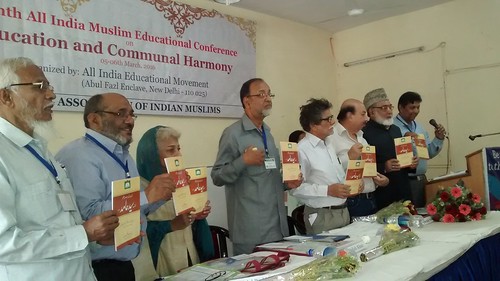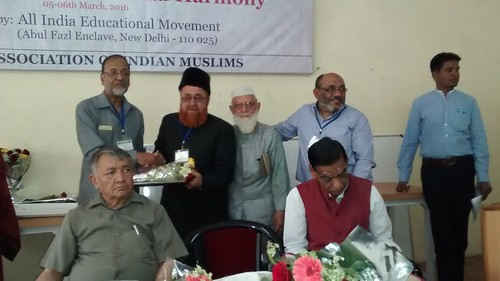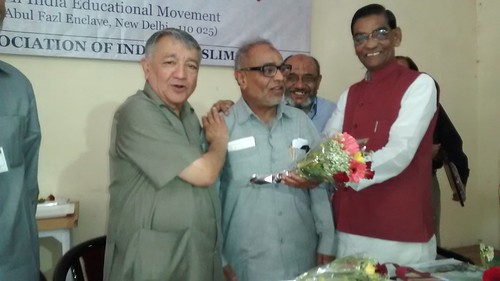7th All India National Educational Conference concludes in Bhopal
By Pervez Bari, TwoCircles.net,
Bhopal: A two-day 7th All India National Educational Conference on the theme of “Education and Communal Harmony” held here in Bhopal by the All India Educational Movement, (AIEM), has demanded that the proposed New Educational Policy should integrate valuable concepts of the liberal-universal education model prevalent in some North European countries like Finland and Denmark.
The said model is considered to be most effective in promotion of human development and establishment of an egalitarian society.
The conference during the two days had detailed discussions on various other topics which have been included in the resolutions such as New Education Policy, Changing Scenario of Education, Quality Education in Schools, Right to Education and Empowerment of Women through Education.
The conference was held under the aegis of local organisation Association of Indian Muslims, (AIM), here in Rotary Club on March 5 & 6, 2016. Apart from inaugural and valedictory functions there were six other sessions during the conference on topics such as Education in Plural Society; Role of Islam in promoting Tolerance in society; The Changing Scenario of Education; New Education Policy; Quality Education in Schools (panel discussion) and Empowerment of Women through Education.

A souvenir on late Saiyid Hamid, Chancellor Hamdard University, New Delhi was also released on the occasion.
The resolution on Communal Harmony said that the State Education policy should essentially promote all inclusive policy which is free from all biases. It should promote brotherhood and communal harmony among all.
“Striving for uniformity in a society is a myth which harms notion of unity. The AIEM believes that communal harmony is of paramount importance for making India strong. Therefore, AIEM exhorts for creating harmonious atmosphere in educational institutions. The AIEM stands for non-biased curriculum and non-partisan behaviour in all educational institutions. We stand for an educational system which safeguards the beauty of our cultural, linguistic, religious and communal diversity of the county”, the resolution said.
The resolution on Communal Harmony further said that promotion of tolerance has become highly crucial in the current national discourse since it is important for national integration and inclusive development. Education is and can be an indispensible instrument for the promotion of tolerance which can be promoted by strengthening the idea of common neighbourhood schools and improving quality of government schools and inculcating moral education based on best references from all cultures and religions.
This was one of the resolutions on Communal Harmony amongst a number of others which were approved by voice vote in the valedictory session of the All India National Educational Conference.
Dr. Tariq Zafar, Vice Chancellor, Bhoj Open University, was the chief guest while Amanullah Khan presided over in the valedictory session.

Shiv Chaubey, Chairman Madhya Pradesh State Mining Corporation, was the chief guest of the inaugural session while Arun Bhatnagar (IAS retd.); Qaisar Zaman, secretary of Kurwai Education Society; and Raj Kumar Keswani, a senior journalist, were guests of honour on the occasion.
Keswani is the first journalist who brought attention to the safety lapses and impending Bhopal disaster that eventually came to pass at the town’s Union Carbide pesticides plant over night on December 2–3, 1984.
Speaking on the occasion Shiv Chaubey appreciated the efforts of All India Educational Movement to spread the message of education for weaker sections and selecting Bhopal as venue for their 7th Educational Conference.
In the resolution on New Education Policy the conference exhorted the authorities to ensure equitable quality education and provision of teaching in mother tongue in schools as per the Policy. It lamented that our education system is geared towards teaching and testing knowledge at every level as opposed to teaching skills. “Give man a fish and you feed him one day, teach him how to catch fishes and you feed him for a lifetime.” Knowledge is largely forgotten after the semester exam is over. Still, year after year Indian students focus on cramming information. The best crammers are rewarded by the system. This is one of the fundamental flaws of present education system.
The conference felt that the existing educational policies have not been properly analysed and implemented which are necessary before a new policy is adopted. The 1986 Education Policy had recognized that Muslims and Neo-Buddhists are educationally backward but apart from creating Maulana Azad Education Foundation, the Government has failed to address the needs of weaker sections and minorities.
On Quality Education in schools the resolution said: “Our public and private education systems need to keep up with changing trends and reward creativity, original thinking, research and innovation. The system should evolve zero-defect policy on quality education and ensure physical, mental, psychological and linguistic development of the students by adopting parameters advocated by educational experts in the field. The Conference resolved that there is a need to create not only good doctors, engineers and scientists but above all good human beings. The Government should also arrange periodical short term courses to achieve desired quality education.
The resolutions on Right to Education said : Enacted in August 2009, The Right to Free and Compulsory Education Act, (RTE), is yet to be implemented properly in the country. The state has failed to open required numbers of schools with facilities enunciated in this Act. The mandatory norms of infrastructure have hampered development of small units. Virtually these norms have turned the education in corporate sector and increased cost of education which is beyond the reach of middle and lower middle classes. AIEM exhorts the government to relax these norms and allow blooming schools from event the huts. These requirements should be done away while granting recognition to private schools especially in rural and economically deprived arrears.

The extent of Act should be enlarged from lower ages to higher ages. There should be more choices as well as options of timings to suit every child. A morning only school may not fit all children. It is now virtually universally recognized that 12 years of school education beginning at the age of six, preceded by appropriate pre-school education, is a minimum requirement. Therefore, in virtually all developed countries, a vast majority of children including those of the rich and powerful go to government schools for 12 years of totally free education. The RTE Act is unconcerned about the four most important years of school education – that is, from Class IX to Class XII.
The resolutions on Women Education said: In recent years education among girls has increased manifold. Performance of girl students today is far better than boys. Education is most important tool of women empowerment. The welcome trend should continue. At the same time it is unfortunate that our boys leg far behind which is creating several socio-cultural problems. The community should come forward to create competitive atmospheres for boys along with giving emphasis on girl education.
The various sessions were chaired by Dr. Zafarul Islam Khan, former president All India Muslim Majlis-e-Mushawarat; A. R. Agwan, Chairman Universal Knowledge Trust; Dr.Khwaja Mohammad Shahid, former Pro-Vice Chancellor, MANUU; Syyed Mansoor Agha, Vice President, AIEM; and Dr. Shabistan Ghaffar, chairperson Confederation for Empowerment of Women through Education.
Some eminent personalities who took part in the proceedings included Dr. Javed Jamil, (Thinker, Writer & Author from New Delhi); Maulana Abrar Ahmed Islahi (Muslim World League, Makkah); Mohammad Raphy, (Executive Secretary, India 2047 Project under the banner of Empowerment India Foundation, New Delhi); Maulana Syed Sharafat Ali Nadwi (Taj-ul-Masajid, Bhopal) and Ahmed Ali (secretary, Education, JIH, MP) Arif Aziz, (Senior journalist, Bhopal); Thouseef Madikeri, (National secretary Students Islamic Organisation, SIO); Kaleem-ul-Hafeez (Dr. Mumtaz Education Society, Uttar Pradesh); Dr. Idrees Qureshi (president, Muslim Education Society, (MES), UP);Dr. Mohammad Ahsan (Director, Regional Centre of MANUU, Bhopal); Dr. Mehruddin(Delhi); Tariq Azam (Malaysia); Prof. Shama Niyazi, Barkatullah University, Bhopal); Aalima Dr. Haleema Sadia (Principal, India International School, Sharjah, UAE), Mamdooha Majid, (secretary, AIEM); Prof. Asfa Yasin, Central Institute of Vocational Education, Bhopal etc.

